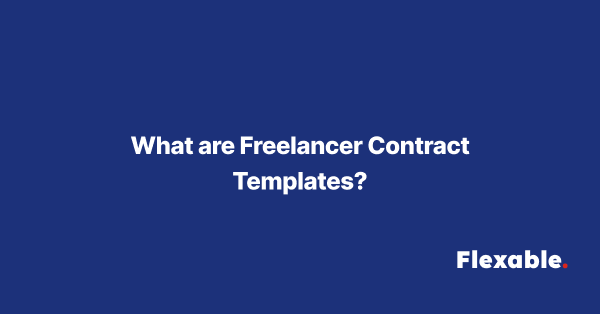A freelancer contract template is a ready-to-use document that includes essential clauses and legal language tailored to the freelancing industry. It provides a structured framework that freelancers and clients can modify to fit their specific needs. These templates are especially useful for freelancers who may not have the time or resources to draft contracts from scratch for every project.
Key Features of Freelancer Contract Templates:
- Pre-Written Clauses: Covers standard terms like payment, deadlines, intellectual property, and confidentiality.
- Customizable Sections: Freelancers and clients can adapt the template to match the project’s scope and unique requirements.
- Legal Framework: Ensures the agreement is written in legally binding terms that protect both parties.
- Industry-Specific Options: Templates can be tailored to specific freelance fields, such as writing, graphic design, programming, or marketing.
Key Elements of a Freelancer Contract Template
A well-structured freelancer contract template includes several essential components to ensure clarity and fairness:
1. Scope of Work:
- Clearly defines the project deliverables, services, and expectations.
- Outlines what is included (and excluded) in the freelancer’s responsibilities.
- Example: “The freelancer will deliver three logo design concepts and one final version based on the client’s feedback.”
2. Payment Terms:
- Specifies the agreed-upon payment structure (e.g., hourly rate, fixed fee, or milestone payments).
- Includes payment schedules, due dates, and methods (e.g., bank transfer, PayPal).
- Addresses late payment penalties, if applicable.
3. Deadlines and Timelines:
- Establishes deadlines for project completion or specific milestones.
- Provides flexibility for extensions if necessary, while avoiding ambiguity.
4. Revisions Policy:
- Details the number of revisions or edits included in the contract.
- Sets terms for additional charges if the client requests extra changes beyond the agreed scope.
5. Confidentiality and Non-Disclosure:
- Ensures that sensitive information shared during the project remains confidential.
- Protects intellectual property and trade secrets.
6. Intellectual Property Rights:
- Clarifies ownership of the work after completion.
- Example: “The client will retain full ownership of the final deliverables upon receipt of payment.”
7. Termination Clause:
- Specifies conditions under which either party can terminate the contract.
- Outlines what happens in the event of cancellation, such as payment for work completed up to that point.
8. Dispute Resolution:
- Provides a process for resolving conflicts, such as mediation or arbitration, to avoid legal battles.
Benefits of Freelancer Contract Templates
Freelancer contract templates offer several advantages for both freelancers and clients, making them an essential tool for smooth collaborations.
1. Saves Time and Effort:
Templates eliminate the need to draft contracts from scratch, allowing freelancers and clients to focus on the project itself.
2. Ensures Clarity:
Clearly defined terms prevent misunderstandings by setting expectations for both parties upfront.
3. Provides Legal Protection:
A well-written contract template ensures both freelancers and clients are legally protected, minimizing the risk of disputes.
4. Enhances Professionalism:
Using a structured contract demonstrates professionalism and builds trust with clients, especially for new freelancers.
5. Customization Flexibility:
Templates can be tailored to suit the unique requirements of each project, industry, or client.
Where to Find Freelancer Contract Templates
Freelancers can access contract templates from various sources, including:
1. Freelancing Platforms:
- Platforms like Upwork and Fiverr offer built-in contract features or templates for users.
2. Legal Websites:
- Websites such as LegalZoom and Rocket Lawyer provide downloadable templates tailored to freelance work.
3. Industry Associations:
- Professional organizations, such as the Freelancers Union, offer free or low-cost contract templates specifically designed for freelancers.
4. Contract Software:
- Tools like Bonsai, HelloSign, or PandaDoc offer customizable contract templates integrated with e-signature capabilities.
Best Practices for Using Freelancer Contract Templates
- Review and Customize:
- Always tailor the template to reflect the specifics of the project and the agreement with the client.
- Avoid using generic terms that may not apply to your work.
- Seek Legal Advice:
- For complex or high-value projects, consider consulting a lawyer to review the contract.
- Communicate Clearly:
- Discuss the terms with the client before finalizing the contract to ensure mutual understanding and agreement.
- Use E-Signatures:
- Secure legally binding agreements by using digital signature tools, which are both efficient and environmentally friendly.
Conclusion
Freelancer contract templates are invaluable tools that simplify the process of creating clear, professional agreements. By providing a structured framework for outlining project terms, deliverables, and payment arrangements, these templates protect the interests of both freelancers and clients.
Whether you’re a freelancer looking to streamline your onboarding process or a client seeking to formalize your collaborations, leveraging contract templates ensures that every project starts with clarity and confidence. A strong contract isn’t just a legal safeguard, it’s the foundation for a successful and productive working relationship.

